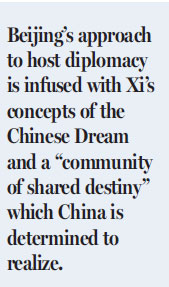Host diplomacy for a new world order
Since the 18th National Congress of the Communist Party of China in November 2012, China has adopted an active approach to diplomacy both globally and domestically. While President Xi Jinping has left his mark and voice in almost every corner of the world thanks to his many foreign visits in the past five years, China has hosted close to 10 signature events of global or regional importance, with consistent focus on China-related and multilateral issues, since 2014.
The concept of "host diplomacy" was put forward by Foreign Minister Wang Yi in early 2014 while talking about China hosting the Conference on Interaction and Confidence Building in Asia (CICA) summit and the Asia-Pacific Economic Cooperation meeting in the same year. Host diplomacy can be defined as diplomatic events hosted or initiated by a country that has the ability to set and execute agendas, which other participants find attractive and are willing to support.

China's host diplomacy began with the hosting of the fourth CICA summit in Shanghai on May 20-21, 2014, which focused on security. On Nov 10-12 the same year, Beijing hosted the APEC Economic Leaders' Meeting with a focus on Asian economy. China's host diplomacy intensified in 2015 when it hosted four international events-China-Latin America and the Caribbean Summit, which focused on deepening Sino-Latin American cooperation; Boao Forum for Asia, where Xi articulated the concept of "a community of shared destiny"; the military parade to mark the 70th anniversary of the victory in the Chinese People's War of Resistance Against Japanese Aggression (1931-45); and the Fourth China-Central-Eastern Europe Leadership Summit (16+1) with a focus on the Belt and Road Initiative.









